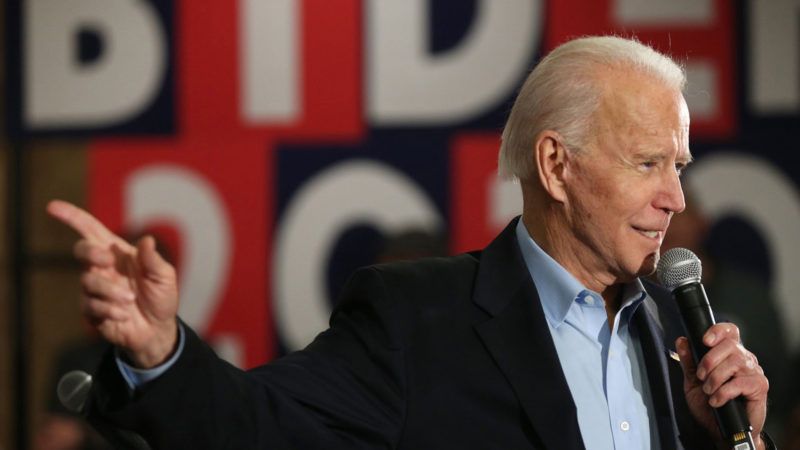Biden Tries To Buy Rust Belt Votes With Protectionist 'Buy American' Plan
Biden says he'll oppose attempts to repeal the Jones Act and will push for tighter "Buy American" policies that hike the price of infrastructure projects.

If you were hoping that presumptive Democratic presidential nominee Joe Biden might offer a robust defense of free trade as an alternative to Trump's "economic nationalism," I have some bad news for you.
As part of a six-part economic plan unveiled last week, Biden says he would tighten so-called "Buy American" rules for government projects and would oppose any effort to repeal an antiquated shipping law that keeps out competition and raises prices. Biden's economic plan is less extreme than what some other Democratic candidates might have put forth, but it's still a cynical bid for the Rust Belt vote that will increase the federal government's influence over the marketplace for what's likely to be little actual economic gain.
"If I am fortunate enough to be elected president, I will be laser-focused on working families," Biden said in a Thursday speech from a suburb of Scranton, Pennsylvania. He promised to hike government spending on American-made industrial goods by $400 billion as part of an overhaul of government procurement rules, along with $300 billion in new government spending on domestic research and development.
Biden also said he would update Buy American rules already in place for government procurement to require a larger share of federal purchasing comes from domestic suppliers—and to cut the number of waivers granted to allow foreign purchasing.
That's a formula for "higher costs and possible diplomatic friction," notes The Washington Post, because the mandate will prevent the government from buying cheaper goods and may cause other countries to retaliate against American businesses.
That's what happened in 2009, when the Obama administration embedded strict Buy American provisions inside the American Recovery and Reinvestment Act (ARRA) stimulus bill. "Buy American guidelines are complicating life for American companies, muddling municipal bidding procedures and blunting the overall effect of the stimulus," The Wall Street Journal reported in September 2009. The Journal highlighted the story of a Wisconsin-based manufacturer of sewage equipment that lost roughly 25 percent of its business when Canadian municipalities imposed retaliatory measures blocking American suppliers from bidding on public contracts.
With so many manufacturers dependent on supply chains that criss-cross the U.S.-Canada and U.S.-Mexico borders, tightening these laws seems likely to be more of a disruption than a boon.
Buy American rules are "often just plain incompatible with the realities of multinational investment and 21st century global supply chains," writes Scott Lincicome, a senior fellow in economic studies at the Cato Institute, a libertarian think tank.
If Biden's support for Buy American laws is questionable at best, his commitment to the Jones Act is downright nonsensical. The Jones Act is a 100-year-old law that requires all shipping between U.S. ports to be done on ships that are American-built, American-flagged, and operated by American crews. The protectionist law is the chief reason it is absurdly expensive to ship goods to places like Hawaii and Puerto Rico.
Trump seemed to embrace the idea of repealing or at least scaling back the Jones Act in 2019, but he abandoned the effort when he faced political resistance, the Washington Examiner reported on Sunday.
Biden wants to expand it. His newly announced economic program reiterates his "consistent and strong" advocacy for the Jones Act and promises to "take steps to ensure American cargo is carried on U.S.-flag ships, leading to additional demand for American-made ships and U.S. merchant mariners."
That's not what the Jones Act has done. In fact, the number of ships that meet the Jones Act's requirements for operating between American ports has shrunk from 193 in 2000 to just 99 in 2018. It costs more than three times as much to build a cargo ship in America as it does in some other countries, according to a 2017 report from the Cato Institute. Unsurprisingly, American shipping companies respond to that incentive by buying foreign-built ships. That means there are fewer ships capable of serving American ports. Fewer ships means higher prices.
It might make some political sense for Biden to promise to be, essentially, a more competent protectionist than Trump as he tries to flip the Rust Belt states that were key to Trump's win in 2016. But if Biden looks at the three and a half years of antagonistic, nationalist trade policies that the Trump administration has championed and concludes that America needs more of that—well, maybe there really is cause for concern about his mental acuity.

Show Comments (68)